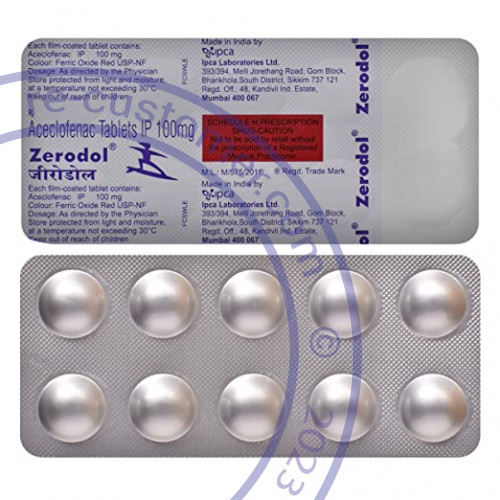- Trusted Tablets
- Osteoporosis
- Aceclofenac

Brand(s): Hifenac / Zerodol
Manufacturer: Intas Pharmaceuticals / Ipca Laboratories
Disease(s): Osteoarthritis / Rheumatoid Arthritis / Ankylosing Spondylitis
| Package | Price | Per tablet | Savings | Order |
|---|---|---|---|---|
| 100mg × 180 tablets | $ 107.95 | $ 0.60 | $ 197.75 | Add to cart |
| 100mg × 120 tablets | $ 83.95 | $ 0.70 | $ 119.85 | Add to cart |
| 100mg × 90 tablets | $ 71.95 | $ 0.80 | $ 80.90 | Add to cart |
| 100mg × 60 tablets | $ 65.95 | $ 1.10 | $ 35.95 | Add to cart |
| 100mg × 30 tablets | $ 50.95 | $ 1.70 | Add to cart |
Aceclofenac tablets
What is aceclofenac?
Aceclofenac belongs to a group of medicines called non-steroidal antiinflammatory drugs, or NSAIDs.
Aceclofenac is used to relieve pain and inflammation that occur with:
- osteoarthritis
- rheumatoid arthritis
- ankylosing spondylitis.
What you need to know before you take Aceclofenac?
Do not take Aceclofenac:
- if you are allergic to aceclofenac or any of the other ingredients of this medicine
- if you have a history of, suffer from, or suspect that you have a stomach or intestinal ulcer or bleeding especially if it is related to previous NSAIDs treatment. Signs of stomach bleeding include passing tarry stools, vomiting blood or particles that look like coffee granules
- if you have bleeding or bleeding disorders
- if you have established heart disease and / or cerebrovascular disease e.g. if you have had a heart attack, stroke, ministoke (TIA) or blockages to blood vessels to the heart or brain or an operation to clear or bypass blockages
- if you have or have had problems with your blood circulation (peripheral arterial disease)
- if you suffer from severe liver failure or severe kidney failure
- if you are more than 6 months pregnant(in your last trimester).
Warnings and precautions
Talk to your doctor or pharmacist before taking Aceclofenac if you:
- have inflammatory bowel disease or chronic inflammatory bowel disease (Crohn’s disease). Signs of these illnesses include heartburn, indigestion, feeling sick (nausea) or being sick (vomiting), bloating, diarrhoea or constipation.
- are a smoker
- have diabetes
- have angina, blood clots, high blood pressure, raised cholesterol or raised triglycerides
- suffer from asthma or any other breathing problems
- suffer from any form of liver or kidney disease, your doctor will monitor you closely and give you the lowest possible dose to treat your symptoms
- suffer from a blood clotting disorder
- suffer from a blood disorder known as porphyria or any other blood disorder
- have recently undergone major surgery
- are elderly (your doctor will prescribe you the lowest effective dose for the shortest period of time)
- have systemic lupus erythematosus (SLE) or other problems with the skin as you may be more likely to develop a form of meningitis that cannot be passed on to other people
- are currently suffering from chicken pox or shingles.
What should I avoid while using Aceclofenac?
In the first month of treatment you are at a higher risk of having serious skin reactions. Stop taking aceclofenac if you get a skin rash, mouth lesions (damage to the skin or gums) or any other signs of an allergic reaction (see section 4 ‘Possible side effects’).
If you are receiving long-term treatment with Aceclofenac, especially at high doses, your doctor may wish to monitor your progress with some blood tests.
Medicines such as Aceclofenac may be associated with an increased risk of heart attack (myocardial infarction) or stroke. Any risk is more likely with high doses and prolonged treatment. Side effects may be minimised by using the lowest effective dose for the shortest duration necessary. Do not exceed the recommended dose or duration of treatment.
What other drugs will affect Aceclofenac?
Tell your doctor or pharmacist if you are taking, have recently taken or might take any other medicines, including medicines obtained without a prescription, especially any of the following:
- medicines used to treat depression or manic depression (lithium, fluoxetine, citalopram)
- medicines used to treat heart failure and irregular heart beats (cardiac glycosides e.g. digoxin)
- medicines used to increase the rate of urine excretion (diuretics or ‘water tablets’ e.g. furosemide)
- medicines that stop blood clotting (anticoagulants e.g. warfarin, heparin)
- medicines used to lower blood sugar levels (antidiabetic drugs e.g. metformin)
- methotrexate which is used to treat cancer and autoimmune disorders
- mifepristone which is used as an emergency contraceptive or to induce abortions
- any other NSAIDs (e.g. aspirin (acetylsalicylic acid), ibuprofen, naproxen, diclofenac)
- medicines to reduce inflammation (corticosteroids e.g. prednisolone, hydrocortisone)
- medicines used to prevent organ or tissue rejection (ciclosporin or tacrolimus)
- medicines used to treat an infection (quinolone antibiotics, e.g. ciprofloxacin)
- medicines used to treat high blood pressure (antihypertensives)
- zidovudine, a medicine used to treat HIV infection.
These drugs may increase your risk of experiencing side effects.
How to take Aceclofenac
Always take this medicine exactly as your doctor or pharmacist has told you. Check with your doctor or pharmacist if you are not sure.
The tablets should be swallowed whole with a glass of water. Aceclofenac can be taken with or after food. Do not crush or chew the tablets.
Aceclofenac possible side effects
Like all medicines, this medicine can cause side effects, although not everybody gets them.
STOP taking your medicine and contact a doctor or visit your nearest hospital emergency department immediately if you experience any of the following side effects:
Rare (may affect up to 1 in 1,000 people):
- Heart failure or heart problems which can cause shortness of breath or ankle swelling.
- Severe allergic reaction (anaphylactic shock). Symptoms may include difficulty breathing, wheezing, abnormal pain and vomiting.
- Stomach ulcer, stomach bleeding or perforation of the stomach, large intestine or bowel wall. Symptoms could include severe abdominal pain, vomiting blood (or liquid with what looks like coffee grounds), blood in the faeces (stools/motions) or passing black tarry stools.
- Itchy swollen skin, skin rash, fever, tightness of the chest and difficulty with breathing (angioedema).
Very rare (may affect up to 1 in 10,000 people):
- Itchy skin, yellowing of the skin or whites of the eyes caused by liver problems (hepatitis).
- Inflammation of the pancreas which causes severe pain in abdomen and back.
- Kidney problems such as producing little or no urine, urinating more often or less often, lower back pain or have blood in your urine.
- Serious skin condition with severe blisters and bleeding in the lips, eyes, mouth, nose and genitals (Stevens Johnson syndrome).
- Severe blistering and peeling of the top layer of the skin.
- Reduced white or red blood cell count which can lead to fever, sore throat or swelling of the glands (bone marrow depression).
- Abnormal breakdown of red blood cells causing tiredness, shortness of breath or loss of appetite with a yellowing of the skin or whites of the eyes.
If any of the following side effects gets serious, or if you notice any side effects not listed in this leaflet, tell your doctor or pharmacist:
Common (may affect up to 1 in 10 people):
- Dizziness.
- Indigestion, stomach pain.
- Feeling sick.
- Diarrhoea.
- Increased liver enzymes in the blood.
Uncommon (may affect up to 1 in 100 people):
- Constipation, wind.
- Being sick.
- Mouth ulcers.
- Itchy skin, rash.
- Increase in blood urea levels.
- Increase in blood creatinine levels.
- Inflammation or irritation of the lining of the stomach (gastritis).

Can i help you?



